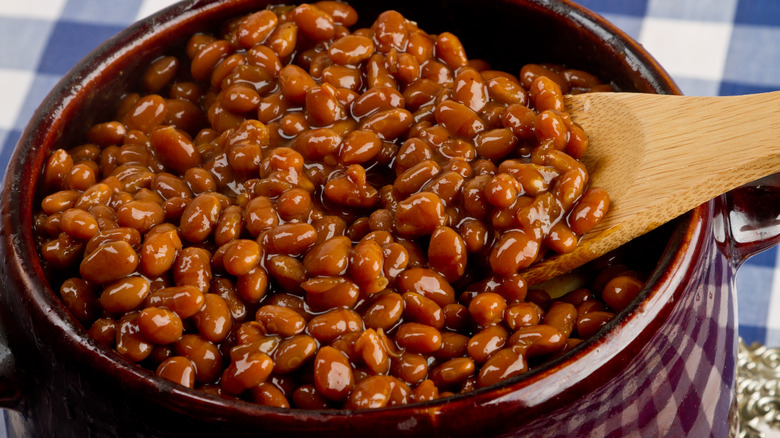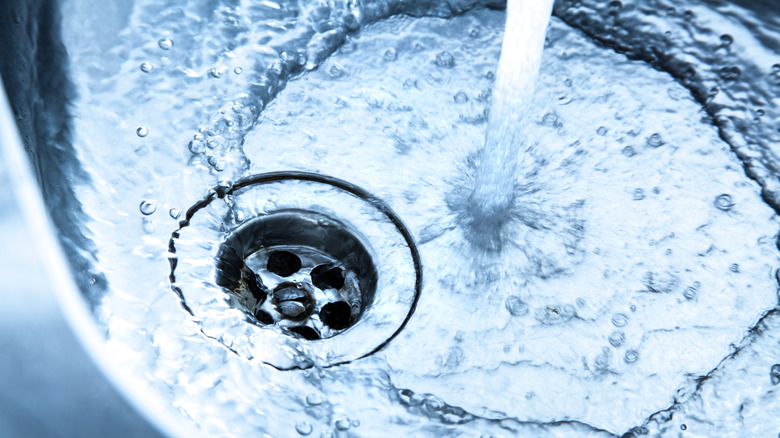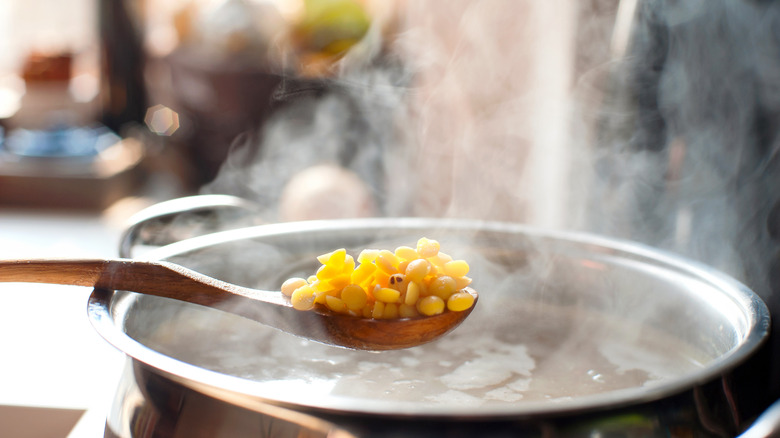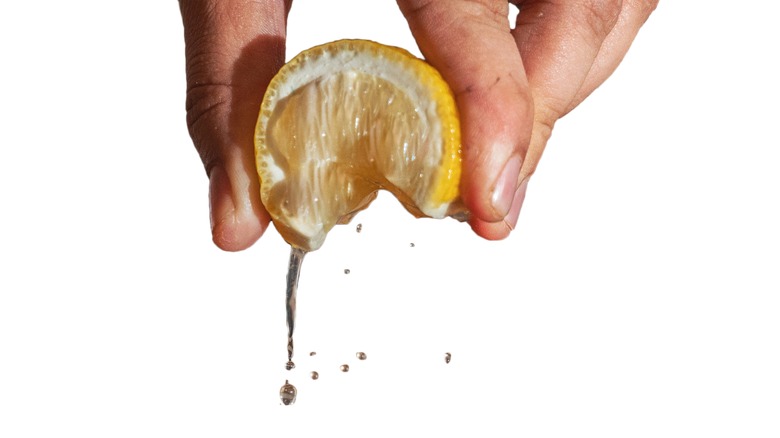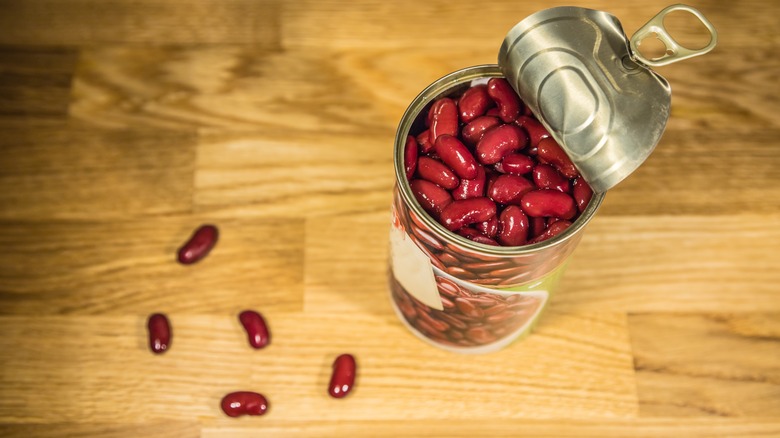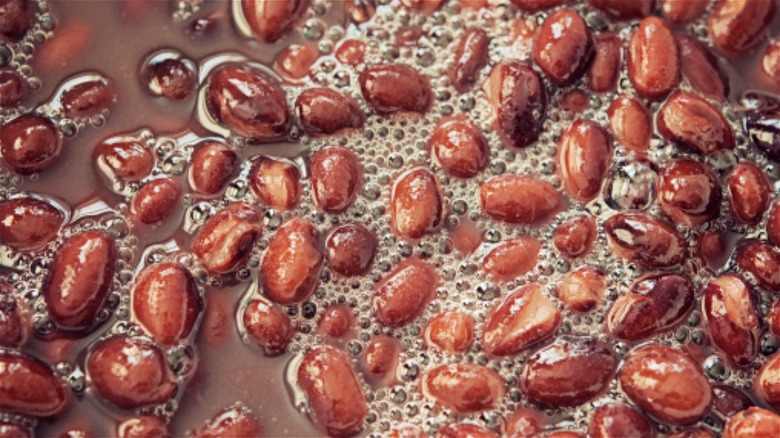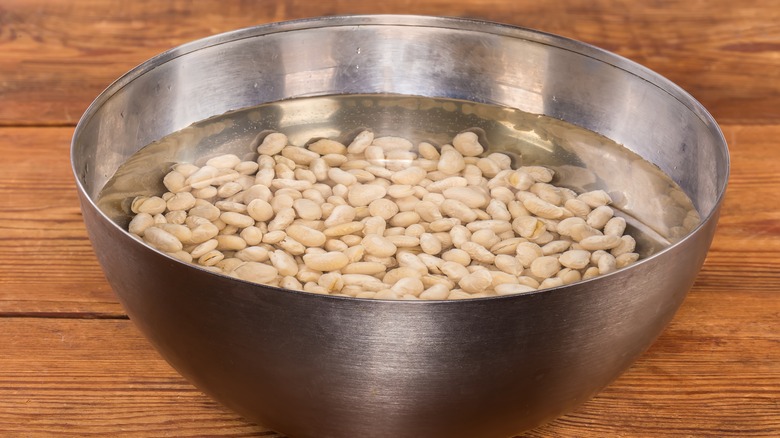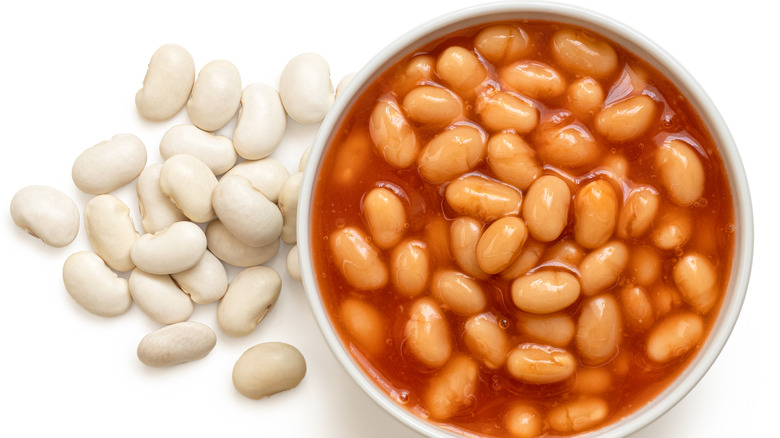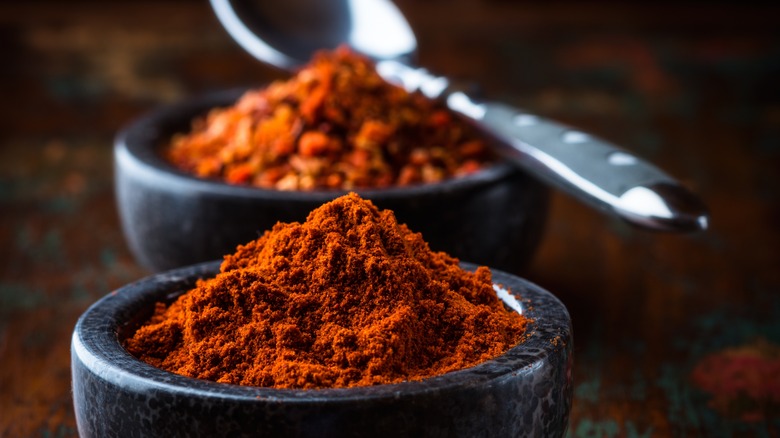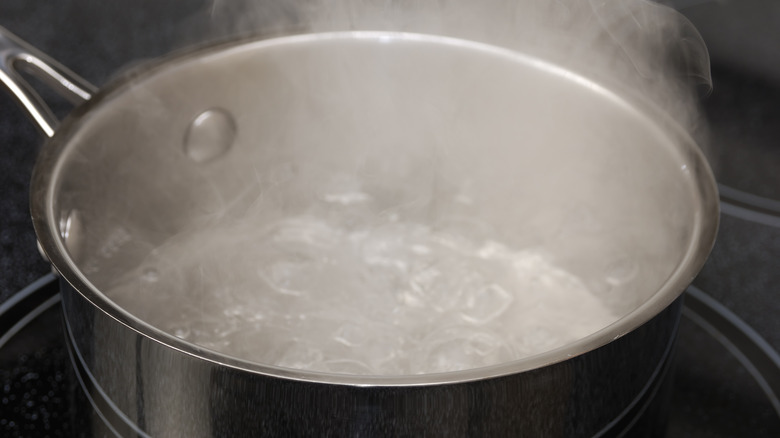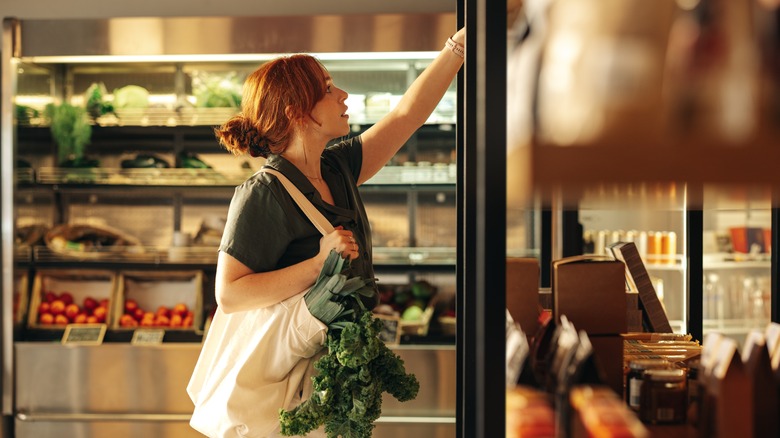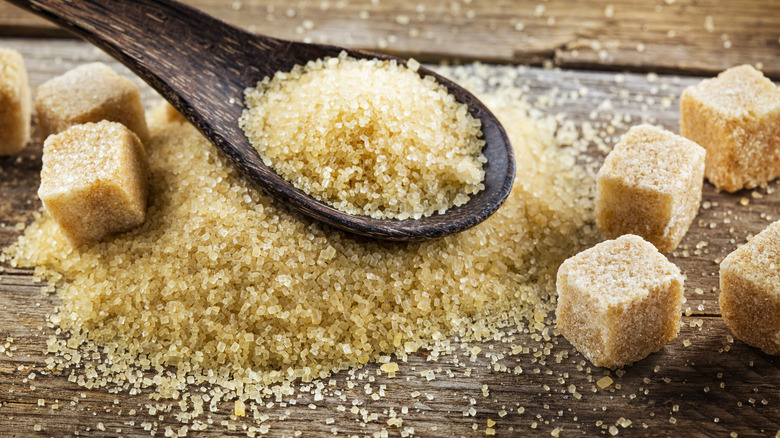11 Mistakes Experts Say You Should Never Make When Cooking Baked Beans
Baked beans are the quintessential side dish to many of the foods perfect for the grill that we hold near and dear to our hearts, but let's be real: There's a right way and wrong way to go about making them. Whether you opt to prepare your baked beans using the canned variety or you're creating them from scratch, there are some things you'll need to know before flexing your culinary skills when whipping up this beloved summer-season side dish.
We've consulted several food experts for some insights into the common mistakes people often make when cooking baked beans. Though we're sure you could think up a few on your own, our pros blew us away with their tips and know-how. We're chomping at the bit to share.
So, pull up a seat and get comfortable. You've got VIP access to some of the best information out there to help you pull off baked beans that'll be worthy of a chef's kiss. Join us as we delve into the 11 mistakes experts say you should never make when cooking baked beans.
1. Cooking with hard water
If you're making baked beans from scratch using dried beans, you'll want to keep in mind the type of water you're using. Kevin Ashton, a seasoned chef and culinary advisor at Restaurantji with over 40 years of experience whose meals have graced the tables of celebrities and VIPs, including former U.S. presidents and the late Queen Elizabeth II, explains. "Hard water contains calcium, which makes it hard for baked beans to soften," the chef says. "Under normal conditions, beans soften when cooked because of the conversion of pectin — a compound within the beans. However, the presence of calcium in water hinders the process of pectin conversion, causing the beans to remain hard even after several hours of cooking."
As frustrating as this sounds, there's an easy and simple solution that could save you time. Ashton notes that it sometimes can be better to simply use purified water instead of tap water. Doing it this way will allow the beans to soften more quickly, getting you that much closer to your delicious summer-ready baked beans. Another tip for softening beans? Apparently, adding baking soda to bean water in the ratio of one teaspoon per cup of dry beans works wonders as it makes the water more alkaline and, thus, a better conduit for softening beans. Who knew?
2. Boiling the beans too rapidly
Experts agree that boiling your beans too quickly could spell trouble when it comes to cooking up a sweet and decadent dish. Chef Kevin Ashton informs us that rushing the cooking process can lead to unsavory consequences that none of us wants to encounter when dishing up the ultimate bowl of baked beans. "Baked beans are delicate; when their skin splits open, their starchy insides can easily leak out," the chef explains. "The starch can have a thickening effect on your cooking liquid, resulting in things becoming gloopy." He also mentions the fact that cooking too quickly can result in undercooking the insides of the beans, and let's face it ... none of us wants that.
One final way in which boiling beans too quickly could negatively affect your baked beans is that it could alter the flavor. Eric Sornoso, co-owner of Mealfan, which offers meal delivery service, premade meals, and more, tells us that rushing the cooking process with baked beans causes underdeveloped flavors. Instead, it's far better to cook your baked beans over a slow simmer to allow the flavors to blend together. This will also address the problem of hard beans — by cooking them slowly, you'll be left with a perfectly tender texture.
Cooking baked beans using your Instant Pot or your slow cooker are other great ways to ensure you get the cooking time just right.
3. Adding acidic ingredients too early
While adding an acid like wine or cider vinegar to your baked beans might be tempting, experts agree that it shouldn't be done — at least not too early on in the game. "Many bean recipes include flavor boosters from ingredients such as wine, tomatoes, or lemon juice," chef Kevin Ashton says. "There is nothing wrong with adding [acidic] ingredients to your beans, but if you don't use them correctly, they can ruin your meal." Ashton goes on to explain how acids added to your beans too early may keep them from softening, in much the same way that cooking in hard water also keeps your beans from achieving that perfectly tender texture. In the case of acid, it stops the pectin in the beans' walls from breaking down, causing them to become tougher.
Even so, if you want to add an acid to your baked beans, you still can. As Sunita Yousuf of the blog The Wannabe Cook tells us, you simply need to add your acidic ingredients after the beans are already done cooking. Once the beans are tender, you can then add these ingredients at your leisure. If you don't want to wait, Yousuf posits another idea: simply cook your beans and other ingredients separately before combining them at the end before serving. "This method ensures that your beans will be soft and tender, providing the desired texture for your baked beans," Yousuf explains.
Makes sense!
4. Using canned beans without rinsing
Ever open a can of beans and wonder what the heck they're swimming in? "Because cooked beans can only be stored in the fridge for 3–4 days, preservatives are needed to make this product shelf-stable," blogger Sunita Yousuf explains. "Canned beans come in a thick, cloudy liquid that contains preservatives and high sodium levels." According to most experts we've consulted, the salty liquid in canned beans can ruin the flavor of your baked beans, overpowering them and leaving them un-appetizingly salty, especially if you're adding salt via seasonings to the mix.
Instead, Eric Sornoso of Mealfan recommends rinsing the canned beans thoroughly before using them in your baked beans. "This removes excess sodium and any metallic taste from the canning liquid and helps the beans absorb the flavors of your sauce better," Sornoso says. Simply use a strainer to drain your beans and give them a thorough rinse with tap water before adding them to your favorite baked bean recipe.
We do want to mention that while it's definitely a great idea to rinse your canned beans when making baked beans, this step may not be necessary for other recipes. You should actually think twice before tossing out the liquid from canned beans. Though the canned liquid contains a lot of sodium, it also contains nutrients, such as potassium and folate, according to Diane McKay, Ph.D., assistant professor at Tufts University's Friedman School of Nutrition, Science and Policy. Ultimately, the choice is yours!
5. Overcooking the beans
Overcooking your beans is one surefire way to destroy baked beans. According to Rena Awada, owner and head chef of Healthy Fitness Meals, doing so will cause the beans to become mushy and to lose their texture. "This won't be a big issue if you're using them in a stew or chili, but for baked beans, it's best to cook them until they are tender but still hold their shape," Awada notes. To prevent overcooking, simmer them at a lower temperature and regularly test them for doneness as they cook by sampling a few. "When they reach your desired texture, remove them from the heat and let them cool slightly before serving," Awada states. Not into tasting your beans at intervals? Try using a wooden spoon or fork to gently mash a bean or two against the side of the pot. If they mash easily, the beans are tender and done. If not — well — they may need a bit more cooking time.
Oh, and one more important reminder from Eric Sornoso: "If using canned beans, remember they are already cooked, so they only need to be heated and flavored." By continuing to cook beans that are already cooked, you'll only increase the chances that your baked beans will turn to mush, yielding a gloopy mess that you might be less than excited to dish up alongside your main entrée.
6. Not prepping dry beans properly
Incorrectly cooking dry beans that you'll later use for baked beans is one thing, but forgoing certain steps before cooking them can be even more detrimental. Eric Sornoso states that one thing people often forget is to soak dry beans before cooking them. If they aren't soaked, the result is the need to cook them longer, which often makes for tough beans within your baked bean side dish. Of course, this is a major no-no, especially given that most of us associate baked beans with a deliciously soft texture that perfectly complements its sweet flavor.
With that said, there's a quick fix to this simple mistake, and we're happy to report that it's something you could practically do in your sleep — literally. Instead of cooking your beans from their dry state, soak the beans overnight. This will ensure that the beans are prepped correctly and will cook evenly in the sauce. Don't have that long? Consider using the quick-soak method. According to Sornoso, boiling the beans for two minutes before letting them sit in the hot water for an hour also works well.
One more thing. For the best-tasting beans, you should add a bit of salt to the water that the dry beans are soaking in to help weaken the pectin the same way baking soda does. The salt will result in reduced cooking times and also may prevent the beans from bursting open during simmering.
7. Using the wrong type of beans
While you could technically use any kind of bean for your baked beans, not all beans will create the optimal texture and flavor you want. "Navy beans, great northern beans, or cannellini beans are best for baked beans," Eric Sornoso explains. "These beans hold up well during the long cooking process and absorb flavors beautifully."
So, which beans ought you steer clear of? We're thinking grabs like black beans, pinto beans, and kidney beans tend not to be as traditional due to their overall texture, flavor, and size. Nevertheless, we're sure any beans could work — but if you want your baked beans to yield that classic texture and flavor, we're thinking it might be best to stick to the bean varieties that Sornoso suggests.
If the thought of prepping dry beans scares you and you are unsure about using unflavored canned beans, you could try experimenting with store-bought canned baked beans — if you aren't against it, that is. There are some awesome baked bean recipes out there that include canned baked beans, and when you're low on time, this can definitely be a lifesaver — trust us!
8. Not seasoning properly
Most of us can agree that seasoning can make a difference when it comes to jazzing up food. The same is true for baked beans; in fact, experts agree that seasoning is crucial when it comes to this dish, as it can single-handedly transform your beans from bland to grand.
According to Eric Sornoso, baked beans can end up lacking in flavor if you don't start off with the right seasoning. "Season in layers," Sornoso suggests. "Add salt, pepper, and other spices to the beans as they cook. Taste frequently and adjust seasoning as needed. To balance the flavors, add a touch of sweetness (like molasses, brown sugar, or maple syrup) and acidity (like apple cider vinegar or mustard)." Of course, you'll want to be mindful of timing when you add the acid. As stated earlier, you'll want to only add it once your beans have reached the point of tenderness you desire, rather than including it early on in the cooking process.
Besides adding acid too early, Jessica Randhawa, head chef and recipe developer at The Forked Spoon, recommends waiting a while to add in salt: "Season with salt and spices after the beans have softened, as adding salt too early can hinder the cooking process. Tasting and adjusting seasoning towards the end helps achieve a perfect flavor balance." Noted!
9. Ignoring the liquid levels
Ignoring the liquid levels when cooking baked beans spells trouble, not because it will necessarily make your baked beans taste bad, but because it can oftentimes affect the look and texture of the finished product. "[A common] mistake is adding too much liquid to the beans, resulting in a watery consistency," chef Rena Awada says. "This can happen if you use canned beans or don't drain the soaked beans properly. To avoid this, make sure to drain and rinse your beans thoroughly before adding them to the recipe. You can also reduce the amount of liquid in the recipe or cook it for longer to let some of the liquid evaporate. I also recommend using a thicker sauce or tomato paste to help thicken the beans."
As for exactly how much liquid should be in the beans, consider these tips from Eric Sornoso: "The beans should be covered with liquid during cooking but not swimming in it. Stir occasionally and add more liquid (like water or broth) if the beans are drying out. If [it's] too soupy, remove the lid towards the end of cooking to allow some of the liquid to evaporate." By following these tips, you should be well on your way to creating good-textured and visually satisfying beans as opposed to those that resemble liquid goop.
10. Choosing low-quality ingredients
Using low-quality ingredients may be tempting, especially since these ingredients are often budget-friendly. And while not all generic-brand or low-cost beans perform badly, it's usually best to select a bean brand you know and trust. According to our experts, using low-quality ingredients may work against you when it comes to dishing up noteworthy baked beans. As Jessica Randhawa tells us, using low-quality beans can often lead to a mushy or inconsistent texture. Eric Sornoso chimes in, adding that these same types of low-quality beans can compromise flavor.
Instead, both experts recommend taking your dish up a notch by choosing only the freshest ingredients possible. "Always opt for high-quality, dried beans, and soak them overnight to ensure even cooking and maintained shape," Randhawa recommends. Meanwhile, Sornoso suggests that the freshness of other ingredients, not just the baked beans, makes a difference as well. "Use high-quality beans, fresh vegetables, and good-quality bacon or ham hocks if your recipe calls for them," Sornoso says. "Fresh herbs and spices will also elevate the dish significantly."
Sounds like a plan to us!
11. Including too much sugar
Is it ever possible to use too much sugar when it comes to baked beans? Some of our experts believe it can be. Using too much sugar when cooking your baked beans can make for a cloyingly sweet rendition of the dish that isn't quite so enjoyable. Nicole Durham, owner and recipe developer of Beeyondcereal.com, fills us in on why this is often the case. "Having too much sugar in your baked beans can lead to problems," she states. "Too much sugar makes the other flavors less pronounced, disrupting the flavor balance." In addition, Durham notes that excessive use of sugar can affect the texture and consistency of the beans, yielding an overly thick and syrupy result that isn't desirable. Surprisingly, too much sugar can even lead to an increased risk of your baked beans burning, which can ruin your entire dish in a hurry.
For the health conscious, Durham recommends exploring alternatives to sugar that come from natural sources. "Consider using molasses, honey, or even fruit purees to add sweetness to the beans with less processed sugar," she suggests. "This helps to bring a balance of flavors without some of the risks." Consuming too much refined sugar can elevate your chances of becoming obese, acquiring heart disease, having acne flare-ups, and so much more, according to Healthline. Thus, it may be worthwhile to scale back on the amount, especially if you find yourself consuming sugar-laden baked beans often.
